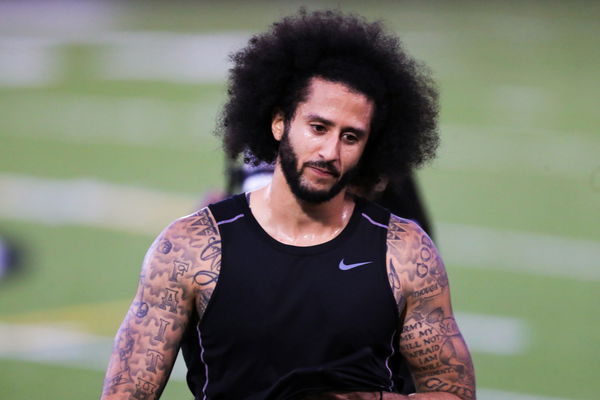
via Getty
RIVERDALE, GA – NOVEMBER 16: Colin Kaepernick looks on during the Colin Kaepernick NFL workout held at Charles R. Drew High School on November 16, 2019 in Riverdale, Georgia. (Photo by Carmen Mandato/Getty Images)

via Getty
RIVERDALE, GA – NOVEMBER 16: Colin Kaepernick looks on during the Colin Kaepernick NFL workout held at Charles R. Drew High School on November 16, 2019 in Riverdale, Georgia. (Photo by Carmen Mandato/Getty Images)
Retired NFL quarterback Colin Kaepernick has attracted media popularity after attempting to join the New York Jets. Despite the rejection, he continues to be a force in the headlines as his controversial exit from the NFL surfaces again. And this time, we get a better glimpse into the world of the former San Francisco 49ers QB.
Colin Kaepernick remained true to his perception of right and wrong when he sat during the national anthem in the 2016 preseason game. This unlawful action raised much criticism and backlash from both the NFL community and the political department. But could the 35-year-old’s actions be a reflection of his gloomy childhood?
ADVERTISEMENT
Article continues below this ad
Colin Kaepernick had a rough childhood
Perhaps Colin Kaepernick’s life behind football plays a huge part in his notion of racial discrimination. His bereaved childhood phase began when his birth mother, Heidi Russo, gave birth to him at 19 and gave him up for adoption a few weeks later. Rick and Teresa Kaepernick took Colin Kaepernick into their care, along with their children Kyle and Devon.

via Getty
PITTSBURGH, PA – SEPTEMBER 20: Colin Kaepernick #7 of the San Francisco 49ers drops back to pass in the first quarter during the game against the Pittsburgh Steelers on September 20, 2015 at Heinz Field in Pittsburgh, Pennsylvania. (Photo by Justin K. Aller/Getty Images)
Growing up as a biracial child, Colin Kaepernick knew he was different from his parents and siblings. But he admits that his foster parents let him be whoever he needed to be, and he “never felt that he was supposed to be white or Black.” But alas! If only the world views him the same way as his parents do!
Racial discrimination became a huge part of his childhood that even crept in as he grew older. He said, “We used to go on driving vacations in summer and stay at motels. And every year, in every motel’s lobby, the same thing happened, getting only worse as I got taller and older.“ He wasn’t even able to go for summer vacations with his family without a manager or someone picking him out of the group as though he wasn’t part of the family because of his color.
But amidst the discrimination, Rick and Teresa Kaepernick have been very supportive of him through every step of his life. He said of his parents, “They have been very loving in the process, and you know I can’t imagine doing it with anybody else.“
ADVERTISEMENT
Article continues below this ad
Colin Kaepernick as a civil rights activist post-NFL retirement
After departing from the NFL in 2016, Colin Kaepernick went on to become a civil rights activist. He founded Know Your Rights Camp with long-time partner Nessa. This charitable foundation has raised more than $1 million to empower disadvantaged youths.

via Getty
NEW YORK, NY – DECEMBER 05: Colin Kaepernick receives the SI Muhammad Ali Legacy Award during SPORTS ILLUSTRATED 2017 Sportsperson of the Year Show on December 5, 2017 at Barclays Center in New York City. Tune in to NBCSN on December 8 at 8 p.m. ET or Univision Deportes Network on December 9 at 8 p.m. ET to watch the one hour SPORTS ILLUSTRATED Sportsperson of the Year special. (Photo by Slaven Vlasic/Getty Images for Sports Illustrated)
The retired NFL player also founded the Colin Kaepernick Foundation, a non-profit organization that protests against oppression and police brutality through education and social activism. He earns the support of famous icons like Alicia Keys for this noble and charitable cause.
ADVERTISEMENT
Article continues below this ad
Maybe Colin Kaepernick’s fixated target on racial discrimination stems from his traumatic childhood, as he was denied certain privileges because he’s black. But perhaps everybody has learned something from these stories. While he may not be on the field anymore, he is certainly making an impression in civil rights activism.
WATCH THIS STORY: “We Don’t Talk During The National Anthem”: Colin Kaepernick’s Controversial NFL Comeback Bid After 6 Years Draws Strong Opposition From American Journalist
ADVERTISEMENT
ADVERTISEMENT
ADVERTISEMENT
ADVERTISEMENT

